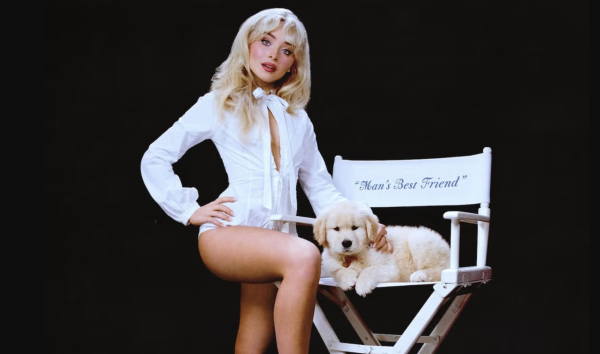Sabrina Carpenter knows what the media thinks of her, and in “Man’s Best Friend,” she affirms once and for all: she doesn’t care.
The pop songstress’s seventh studio album, released Friday, is a lighthearted pop blend of nostalgic musical stylings and in-your-face innuendos to dance away the toils of dating in the modern world. “Man’s Best Friend” is self-aware and self-referential, with catchy riffs and instrumental breaks that are sure to get stuck in listeners’ heads.
Over a decade after her initial studio album “Eyes Wide Open,” Carpenter has cemented herself as an A-list pop singer and carved out a distinctive niche in the music landscape. “Man’s Best Friend” builds upon the self-image she has been crafting since her 2022 album “emails i can’t send.” Her musical branding is meticulous, deliberate satire, hyperbolizing her own feelings about love and sexuality into the caricature she presents to the public.
Carpenter’s pin-up persona has been both decried as regressive and praised as innovative. But regardless of public consensus, Carpenter has made this branding the central aesthetic and lyrical motif of “Man’s Best Friend.” The lyrics practically scream sexuality and, at the same time, seem to be ridiculing the very prospect of sexual appeal to men.
The album’s opener and lead single “Manchild” initially drew criticism for its production. Fans noted that the 80’s synth chords to be a common thread among producer Jack Antonoff’s other producing credits, including Carpenter’s 2024 album “Short n’ Sweet.”
Yet despite the egregiously familiar-sounding riff in “Manchild,” the rest of the album breaks from previous musical motifs to become something unlike any of Carpenter’s other works.
Rather than borrowing chord progressions and production styles from contemporary pop, Carpenter and Antonoff are dipping into the pool of the past. The track “Goodbye” borrows the musical stylings of late 1970s and early 1980s dance pop groups like ABBA or The B-52’s, while “When Did You Get Hot?” has a sultry bassline riff that sounds right out of the early 2000s.
The production on “Man’s Best Friend” takes listeners on a sonic tour across decades, with hooks that feel nostalgic but still fresh and vibrant. The trick? Most of the instrumentals were recorded on live instruments, by way of Antonoff’s Bleachers bandmates, as opposed to strictly digitally crafted synth beats.

The live recordings highlight the standout star of this album: its instrumentals. Antonoff and his Bleachers bandmates threw in a few welcome surprises, like the disco dance break in “Tears” and the shift to a minor chord progression in “My Man on Willpower.”
The second half of the record is an onslaught of standout tracks, including the cathartic “Nobody’s Son.” The sixth track features Antonoff’s signature 1980s synth production amid a lyrical ambush against the immature dating pool Carpenter finds herself stuck in.
The chorus is vulnerable and all too relatable, with the lyrics “Here we go again, crying in bed, what a familiar feeling / All my friends in love and I’m the one they call for a third wheeling,” feeling straight from Carpenter’s diary. It’s the power ballad every chronically single girl has been craving, with an addictive chorus to boot.
Other highlights include the sultry “When Did You Get Hot?” and the flirtatiously fun “House Tour.” “When Did You Get Hot?” is a treat for audiophiles, reviving the dirty pop bassline hook that dominated the early 2000s from artists like Nelly Furtado and Britney Spears. “House Tour,” on the other hand, is a lyrical delight of innuendos set against a backdrop of lively major chords and a pulsating drumline.
Unlike Carpenter’s previous records, “Man’s Best Friend” lacks an emotional through line or compelling narrative. There is no grand emotional story Carpenter tells with the lyrics of this album; it just exists in the present moment, a time capsule of the past year in her life.
But not every pop album needs emotional nuance to serve its purpose, and Carpenter knew that going into the record. She described the process behind “Man’s Best Friend” in an Instagram post Thursday, noting her relief at writing an album “out of pure inspiration and zero pressure.”
Carpenter’s nonchalant approach to creating this album shines through in the finished result. “Man’s Best Friend” is far from revolutionary or experimental in the pop genre, but it serves its purpose as a pop record impeccably. This album is exactly what pop music should be: cheeky, upbeat and something listeners can dance to.
One aspect of Carpenter’s previous work that is notably absent from “Man’s Best Friend” is her vocal range. Carpenter has previously established herself as a vocal powerhouse in albums like “Singular Act II” and “emails i can’t send,” reaching all the way from soprano to a mezzo-tenor, but she remains steadfast in the alto range for this recent project. She does not seem intent to prove herself as a vocalist on “Man’s Best Friend,” instead allowing the playfully retro instrumentation to take center stage.
RELATED: Musical therapy: Taylor Swift’s healing journey in ‘The Tortured Poets Department’
Although the melodies and production on this record are indeed catchy, the lack of vocal showings from Carpenter leaves something to be desired. As such, the album sounds more like a collection of lilted spoken-word poems than a vocalist’s pop record.
The simplicity of Carpenter’s vocal stylings does not, however, detract from the fact that this album is pure dance pop ecstasy. “Man’s Best Friend” isn’t melancholic about dating tribulations, nor does it want listeners to be. Instead, it invites the audience to laugh it off, embracing the chaos of flirtation and singlehood through dance.
The album maintains a consistent sound and aesthetic, hinting at its potential as a concept album, but it remains visually and sonically too similar to “Short n’ Sweet.” Had Carpenter spent more time developing “Man’s Best Friend” and distinguishing it as a unique project, it could have the larger-than-life feel her previous record had.
The 1980s imagery and instrumentation allude to a traditional male-centered romance, while the lyrics laugh in the face of men’s desires. Carpenter may have chosen the title “Man’s Best Friend,” but it is clear to listeners that this album is, above all else, a girl’s best friend.


































































































































